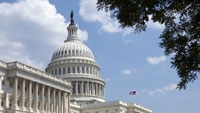A Status Update on FCC Operations
With the government shutdown headed into its second week, a summary of commission services and deadlines

The professional video industry's #1 source for news, trends and product and tech information. Sign up below.
You are now subscribed
Your newsletter sign-up was successful
A stopgap funding bill failed to pass in the U.S. Senate on Friday, which means that the federal government shutdown will last into its second week.
Where does this leave the Federal Communications Commission?
The FCC released a public notice on Sept. 30 announcing that it will “suspend most operations” during the shutdown that began on Oct. 1. As the Georgia Association of Broadcasters noted, this differs from previous shutdowns when the commission indicated it had reserve funds to continue operations temporarily.
As Michi Bradley at REC Networks deftly observed, the FCC’s employees may be feeling the biggest effect from the shutdown.
Approximately 80% of the commission’s staff are currently furloughed and not receiving paychecks.
With multiple deadlines for form filings slated for this month, along with the end of periods for filing comments on significant issues such as the future of the Emergency Alert System and the FCC’s Disaster Information Reporting System, now is a good chance to update where we stand.
The details below are according to the Georgia Association of Broadcasters’ summary of the FCC’s operations during the shutdown.
The professional video industry's #1 source for news, trends and product and tech information. Sign up below.
Applications and Filings
As a result of the shutdown, broadcasters cannot file applications, reports, requests, notifications, pleadings or other documents in the FCC’s License Management System database, which includes all TV, AM, FM, Class A, LPTV, translator and booster stations.
Other commission databases that cannot be updated during the shutdown include the Universal Licensing System—for broadcast auxiliary and microwave filings—and the Emergency Alert System Test Reporting System for EAS equipment and capabilities.
The ETRS Form One deadline had been Oct. 3.
Right now, LMS and ULS can still be accessed for normal lookups. The TV, AM and FM query station search tools and the Audio Division’s tools and calculators are also still available, at least on a limited basis. Our friends at REC Networks note that the Contours API is also still online.
However, the Georgia Association of Broadcasters warns that this could change as the shutdown continues.
Deadlines
- The following details also come from the Georgia Association of Broadcasters’ shutdown summary.
- As we mentioned on Oct. 1, all deadlines during the shutdown are extended until the next business day after the commission resumes its normal operations.
- Special Temporary Authorities that expire during the shutdown are automatically extended until one day after the FCC resumes.
- If an emergency STA is needed, however, it can be requested through the FCC Operations Center at 202-418-1122.
- Reports to a station’s online public inspection file, including Q3 quarterly issues and program lists that are due Oct. 10, may be uploaded the day after the FCC resumes. This also includes EEO reports, donor lists and any updates to a station’s political file.
- All stations must maintain a physical political file and retain all political orders received.
- Any stations that are silent or go silent during the shutdown remain subject to the one-year resumption requirement. Stations should document operations resuming and notify the commission once it opens.
- Broadcasters must also continue to meet construction permit deadlines. License applications and buildout notifications that are needed during the shutdown will be accepted the day after the FCC resumes operations.
- Deadlines for oppositions, replies and other pleadings are currently suspended. New deadlines will be calculated from the FCC’s reopening date.
- For enforcement proceedings, previous deadlines remain, unless otherwise directed by the Enforcement Bureau.
- The FCC’s fee filer system is also currently unavailable.
This article originally appeared on TV Tech's sister brand, Radio World.
Nick Langan is a content producer and staff writer for Radio World, having joined the editorial team in 2024. He has a lifelong passion for long-distance FM radio propagation and is a faculty advisor for 89.1 WXVU(FM). He is also the creator of RadioLand, an FM radio location mobile app, which he completed for his Villanova University graduate thesis.

